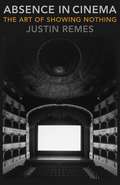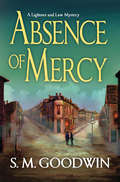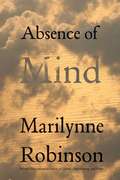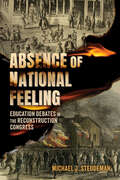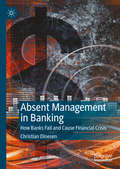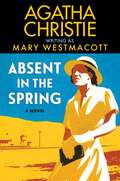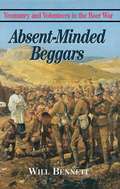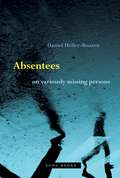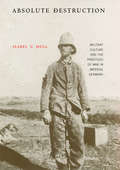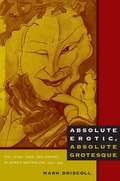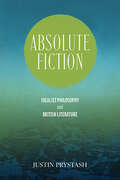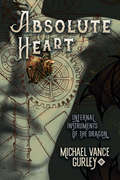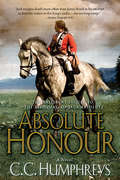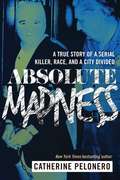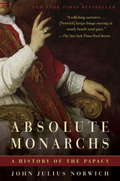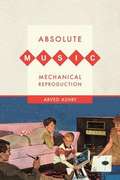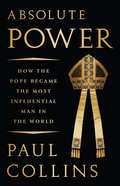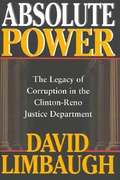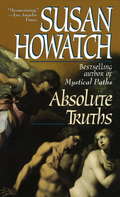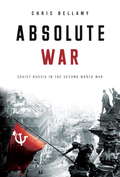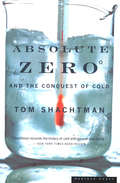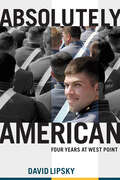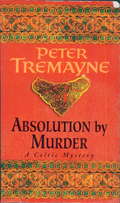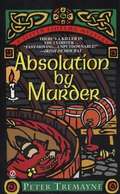- Table View
- List View
Absence in Cinema: The Art of Showing Nothing (Film And Culture Ser.)
by Justin RemesAbsence has played a crucial role in the history of avant-garde aesthetics, from the blank canvases of Robert Rauschenberg to Yves Klein’s invisible paintings, from the “silent” music of John Cage to Samuel Beckett’s minimalist theater. Yet little attention has been given to the important role of absence in cinema. In the first book to focus on cinematic absence, Justin Remes demonstrates how omissions of expected elements can spur viewers to interpret and understand the nature of film in new ways.While most film criticism focuses on what is present, such as images on the screen and music and dialogue on the soundtrack, Remes contends that what is missing is an essential part of the cinematic experience. He examines films without images—such as Walter Ruttmann’s Weekend (1930), a montage of sounds recorded in Berlin—and films without sound—such as Stan Brakhage’s Window Water Baby Moving (1959), which documents the birth of the filmmaker’s first child. He also examines found footage films that erase elements from preexisting films such as Naomi Uman’s removed (1999), which uses nail polish and bleach to blot out all the women from a pornographic film, and Martin Arnold’s Deanimated (2002), which digitally eliminates images and sounds from a Bela Lugosi B movie. Remes maps out the effects and significations of filmic voids while grappling with their implications for film theory. Through a careful analysis of a broad array of avant-garde works, Absence in Cinema reveals that films must be understood not only in terms of what they show but also what they withhold.
Absence of Mercy: A Lightner and Law Mystery (A\lightner And Law Mystery Ser. #1)
by S. M. GoodwinA string of grisly murders in Pre-Civil War New York propels an unlikely pair of detectives into a deadly tinderbox in S. M. Goodwin's debut novel, a sure hit for fans of Will Thomas and C. S. Harris.Jasper Lightner is a decorated Crimean War hero and the most admired inspector in London's Metropolitan Police. Along with a chest full of medals, he's got a head injury that's left large chunks of his memory missing. But Jasper's biggest problem is his father, the Duke of Kersey, who, enraged by a series of front-page newspaper stories extolling Jasper's exploits, decides he's had enough of the embarrassment and uses his political connections to keep his son out of the headlines--and off the police force.Jasper is sent packing to New York City on a year-long assignment to train detectives, and discovers a police department hovering on the brink of armed conflict. Assigned to investigate the murder of philanthropist and reformer Stephen Finch, Jasper joins forces with a man who might be even more of an outsider than he is: Hieronymus Law, a detective who had investigated two almost identical killings--and who is rumored to have taken money to help frame an innocent woman for murder.Law is bent on restoring his good name. But can Jasper trust Hy enough to bring him into the investigation? As the city devolves into madness and law enforcement falls into the hands of dangerous gangs, this unlikely team has no choice but to work together to pursue an adversary more sinister than either has faced alone.
Absence of Mind: The Dispelling of Inwardness from the Modern Myth of the Self
by Marilynne RobinsonEssays from the lectures delivered at Yale University, the Dwight Harrington Terry Foundation. Includes bibliographical references.
Absence of National Feeling: Education Debates in the Reconstruction Congress (Race, Rhetoric, and Media Series)
by Michael J. SteudemanBefore the start of the Civil War, the US Congress seldom took up the question of education, deferring regularly to a tradition of local control. In the period after the war, however, education became a major concern of the federal government. Many members of Congress espoused the necessity of schooling to transform southern culture and behavior, secure civil rights, and reconstruct the Union. Absence of National Feeling: Education Debates in the Reconstruction Congress analyzes how policymakers cultivated a rhetoric of public education to negotiate conflicts over federalism and civic belonging in the aftermath of the Civil War. Reconstruction Era advocates embraced education as a way to orchestrate the affective life of Americans. They believed education could marshal feelings of hope, love, shame, and pride to alter Americans’ predispositions toward other citizens. The most assertive educational advocates believed that schools would physically bring together children divided by race or religion, fostering shared affinities and dissolving racial hierarchies. Schooling promised to be an emotional adhesive, holding together the North and South and facilitating US expansion into the West. Through protracted debates over national education funding, the fate of the Freedmen’s Bureau, and school desegregation, members of Congress negotiated schools’ potential as a vehicle for social change. By Reconstruction’s end, most members of Congress accepted schooling as an element of national reconciliation. To reach this tenuous consensus, though, legislators sacrificed their call for schools to intervene in the feelings of prejudice, resentment, and superiority that sustained the culture of slavery. Rejecting a transformative educational vision, Congress took another tragic step in its abandonment of Reconstruction. Focusing on the words spoken in the Reconstruction Congress, Absence of National Feeling contends that educational rhetoric appealed to legislators debating whether the federal government could, or even should, alter public feeling. Tracing congressional transcripts between 1865 and 1877, author Michael J. Steudeman illustrates that these debates lastingly helped to both define and delimit the possible trajectories of education policy.
Absent Management in Banking: How Banks Fail and Cause Financial Crisis
by Christian DinesenOffering a historical analysis of management in banking from the Medici to present day, this book explores how banks can cause devastating financial crisis when they fail. Rather than labelling management as ‘good’ or ‘bad’, the author focuses on the concept of absent management, which can occur as a result of complexity. The complexity of banking, which intensified alongside the phenomenal growth of banks in the 20th and 21st centuries, resulted in banks that are mismanaged or, at times, even unmanaged. Drawing on business school case studies including Barings and Lehman Brothers, this book showcases how absent management in banking has caused crises, depressions and recessions, and how ultimately it will continue to do so.
Absent in the Spring: A Novel
by Agatha Christie Mary WestmacottA captivating novel of self-discovery by Agatha Christie, written under the pseudonym Mary Westmacott.Agatha Christie, famous for her ingenious crime novels, also wrote about crimes of the heart. Written under the pseudonym Mary Westmacott, Christie’s tales of romantic suspense further explore the human psychology she was so intrigued by, freed from the expectations of her mystery fans. In one of six novels written under this nom de plume, Absent in the Spring tells the story of Joan Scudmore who, returning from a visit to her daughter in Iraq, finds herself unexpectedly alone and stranded in an isolated rest house by flooding of the railway tracks. This sudden solitude compels Joan to assess her life for the first time ever and face up to many difficult truths about herself. Looking back over the years, Joan painfully re-examines her attitudes, relationships and actions and becomes increasingly uneasy about the person who is revealed to her…
Absent-Minded Beggars: Yeomanry and Volunteers in the Boer War
by Will BennettThe British Army suffered one of its greatest crises when in December 1899 the Boer irregulars inflicted three reverses in South Africa in 'Black Week'. A nation grown accustomed to success was stunned. Part of the answer was a very British blend of patriotism and pragmatism. For the first time civilian volunteers and part-time soldiers were allowed to fight overseas to the horror of traditionalist professional soldiers. Yet, by the end of the Boer War, almost 90,000 men had volunteered to serve the Colours. Much of sporting high society joined the newly formed Imperial Yeomanry. The Volunteers sent infantrymen to serve alongside the regulars and the City of London financed the raising of the City Imperial Volunteers. Men also came forward from the colonies. This book tells the story of these volunteer units.
Absentees: On Variously Missing Persons
by Daniel Heller-RoazenAn intellectually adventurous account of the role of nonpersons that explores their depiction in literature and challenges how they are defined in philosophy, law, and anthropology In thirteen interlocking chapters, Absentees explores the role of the missing in human communities, asking an urgent question: How does a person become a nonperson, whether by disappearance, disenfranchisement, or civil, social, or biological death? Only somebody can become a “nobody,” but, as Daniel Heller-Roazen shows, the ways of being a nonperson are as diverse and complex as they are mysterious and unpredictable. Heller-Roazen treats the variously missing persons of the subtitle in three parts: Vanishings, Lessenings, and Survivals. In each section and with multiple transhistorical and transcultural examples, he challenges the categories that define nonpersons in philosophy, ethics, law, and anthropology. Exclusion, infamy, and stigma; mortuary beliefs and customs; children’s games and state censuses; ghosts and “dead souls” illustrate the lives of those lacking or denied full personhood. In the archives of fiction, Heller-Roazen uncovers figurations of the missing—from Helen of Argos in Troy or Egypt to Hawthorne’s Wakefield, Swift’s Captain Gulliver, Kafka’s undead hunter Gracchus, and Chamisso’s long-lived shadowless Peter Schlemihl. Readers of The Enemy of All and No One’s Ways will find a continuation of those books’ intense intellectual adventures, with unexpected questions and arguments arising every step of the way. In a unique voice, Heller-Roazen’s thought and writing capture the intricacies of the all-too-human absent and absented.
Absolute Destruction
by Isabel V. HullIn a book that is at once a major contribution to modern European history and a cautionary tale for today, Isabel V. Hull argues that the routines and practices of the Imperial German Army, unchecked by effective civilian institutions, increasingly sought the absolute destruction of its enemies as the only guarantee of the nation's security. So deeply embedded were the assumptions and procedures of this distinctively German military culture that the Army, in its drive to annihilate the enemy military, did not shrink from the utter destruction of civilian property and lives. Carried to its extreme, the logic of "military necessity" found real security only in extremities of destruction, in the "silence of the graveyard. " Hull begins with a dramatic account, based on fresh archival work, of the German Army's slide from administrative murder to genocide in German Southwest Africa (1904-7). The author then moves back to 1870 and the war that inaugurated the Imperial era in German history, and analyzes the genesis and nature of this specifically German military culture and its operations in colonial warfare. In the First World War the routines perfected in the colonies were visited upon European populations. Hull focuses on one set of cases (Belgium and northern France) in which the transition to total destruction was checked (if barely) and on another (Armenia) in which "military necessity" caused Germany to accept its ally's genocidal policies even after these became militarily counterproductive. She then turns to the Endkampf (1918), the German General Staff's plan to achieve victory in the Great War even if the homeland were destroyed in the process-a seemingly insane campaign that completes the logic of this deeply institutionalized set of military routines and practices. Hull concludes by speculating on the role of this distinctive military culture in National Socialism's military and racial policies. Absolute Destruction has serious implications for the nature of warmaking in any modern power. At its heart is a warning about the blindness of bureaucratic routines, especially when those bureaucracies command the instruments of mass death.
Absolute Erotic, Absolute Grotesque: The Living, Dead and Undead in Japan's Imperialism, 1895-1945
by Mark DriscollIn this major reassessment of Japanese imperialism in Asia, Mark Driscoll foregrounds the role of human life and labor. Drawing on subaltern postcolonial studies and Marxism, he directs critical attention to the peripheries, where figures including Chinese coolies, Japanese pimps, trafficked Japanese women, and Korean tenant farmers supplied the vital energy that drove Japan’s empire. He identifies three phases of Japan’s capitalist expansion, each powered by distinct modes of capturing and expropriating life and labor: biopolitics (1895–1914), neuropolitics (1920–32), and necropolitics (1935–45). During the first phase, Japanese elites harnessed the labor of marginalized subjects as Japan colonized Taiwan, Korea, and south Manchuria, and sent hustlers and sex workers into China to expand its market hegemony. Linking the deformed bodies laboring in the peripheries with the “erotic-grotesque” media in the metropole, Driscoll centers the second phase on commercial sexology, pornography, and detective stories in Tokyo to argue that by 1930, capitalism had colonized all aspects of human life: not just labor practices but also consumers’ attention and leisure time. Focusing on Japan’s Manchukuo colony in the third phase, he shows what happens to the central figures of biopolitics as they are subsumed under necropolitical capitalism: coolies become forced laborers, pimps turn into state officials and authorized narcotraffickers, and sex workers become “comfort women. ” Driscoll concludes by discussing Chinese fiction written inside Manchukuo, describing the everyday violence unleashed by necropolitics.
Absolute Fiction: Idealist Philosophy and British Literature (SUNY series, Studies in the Long Nineteenth Century)
by Justin PrystashExplores the coevolution of Absolute idealist philosophy and British fiction from the Romantic period forward.Absolute Fiction examines the principal form of idealism in the modern period, Absolute idealism, which posits that mind and matter must be understood in relation to all of reality-the universe, the Absolute. This premise was variously articulated by philosophers and writers from Germany, Britain, India, and beyond. Absolute Fiction traces a genealogy from the creative adoption of Hinduism and German Idealism by Coleridge and Carlyle to Aldous Huxley's novelization of Advaita Vedānta. Justin Prystash argues that canonical figures, such as Hegel and George Eliot, as well as overlooked ones, such as May Sinclair and Anukul Chandra Mukerji, found in the Absolute a provocation to account for more and more swaths of reality-accounts that required, at the limits of philosophy, fictional prosthetics. The thematic and formal experimentation of Romanticism, realism, science fiction, horror/weird fiction, and modernism all draw upon Absolute idealism to reconceive subjectivity and ethics. These experiments, far from being antithetical to contemporary literary criticism, reveal it to be more idealist than many would like to acknowledge.
Absolute Heart (Infernal Instruments of the Dragon #1)
by Michael Vance GurleyInfernal Instruments of the DragonAs the British Empire builds power based on new clockwork and steam technology, Ireland draws its might from its potent magical traditions. Only two boys with little in common can end the fighting between the two nations and prevent a terrible worldwide war. Gavin Haveland’s dreams are in the sky with the airships, while his reality as a High Councilman’s son means hiding secrets that will get him executed if revealed. Orion of Oberon is not just a powerful mage, he’s the nephew of the Irish queen, and the one she’s sent him on a quest for the ancient Dragon Stones that will bolster her fading power. In the process, he might restore his family to their rightful place in society. With enemies determined to stop them by any means necessary and war or peace hinging on their success, Gavin and Orion must find a way to work together, despite the centuries of mistrust between their nations.
Absolute Honour
by C. C. Humphreys"A rip-roaring adventure packed with action, drama, and passion."--Kate Mosse, author of Labyrinth Honour matters above all to Jack Absolute. But in order to restore his own, he must pay the price in blood. Blooded on the battlefields of Canada, fresh from a winter spent in a voluptuous widow's bed, the dashing Jack Absolute has every reason to feel good. And life only gets better when the ship returning him to England captures a rich prize, with Jack's sword winning him a large share of the booty. But gold is not all the enemy ship holds. Fever nearly kills Jack, his life barely saved by a new comrade, Red Hugh McClune. Their resulting friendship takes him to Bath to recover--and into a passionate romance with McClune's beautiful cousin, Laetitia. Yet neither cousin is who they seem, and tragedy soon strikes Jack. This time, he escapes with his life, but loses what he loves most--his honour. The thrilling finale to C.C. Humphrey's historical adventure series, Absolute Honour sweeps readers into a world of bravery, betrayal, passion, and glory at whatever cost. From daring espionage in Rome to the battlefields of Spain to a climactic duel against an unbeatable foe, Jack seeks to restore that honour with consequences he could never foresee and a price to be paid in blood. "Jack in all his swashbuckling glory...Humphrey's acting background brings drama to life in Jack's legendary tale."--Booklist "A vigorously imagined, dashingly done espionage adventure."--Literary Review (UK)
Absolute Madness: A True Story of a Serial Killer, Race, and a City Divided
by Catherine PeloneroAbsolute Madness tells the disturbing true story of Joseph Christopher, a white serial killer who targeted black males and struck fear into the residents of New York in the 1980s. Dubbed both the 22-Caliber Killer and the Midtown Slasher, Christopher allegedly claimed eighteen victims during a savage four-month spree across the state. The investigation, aided by famed FBI profiler John Douglas, drew national attention and biting criticism from Jesse Jackson and other civil rights leaders. The killer, when at last he was unmasked, seemed an unlikely candidate to have held New York in a grip of terror. His capture was neither the end of the story nor the end of the racial strife, which flared anew during circuitous prosecutions and judicial rulings that prompted cries of a double standard in the justice system. Both a wrenching true crime story and an incisive portrait of dangerously discordant race relations in America, Absolute Madness also chronicles a lonely, vulnerable man’s tragic descent into madness and the failure of the American mental health system that refused his pleas for help.
Absolute Monarchs: A History of the Papacy
by John Julius Norwich<p>With the papacy embattled in recent years, it is essential to have the perspective of one of the world's most accomplished historians. In Absolute Monarchs, John Julius Norwich captures nearly two thousand years of inspiration and devotion, intrigue and scandal. The men (and maybe one woman) who have held this position of infallible power over millions have ranged from heroes to rogues, admirably wise to utterly decadent. Norwich, who knew two popes and had private audiences with two others, recounts in riveting detail the histories of the most significant popes and what they meant politically, culturally, and socially to Rome and to the world. <p>Norwich presents such brave popes as Innocent I, who in the fifth century successfully negotiated with Alaric the Goth, an invader civil authorities could not defeat, and Leo I, who two decades later tamed (and perhaps paid off) Attila the Hun. Here, too, are the scandalous figures: Pope Joan, the mythic woman said (without any substantiation) to have been elected in 855, and the infamous "pornocracy," the five libertines who were descendants or lovers of Marozia, debauched daughter of one of Rome's most powerful families. <p>Absolute Monarchs brilliantly portrays reformers such as Pope Paul III, "the greatest pontiff of the sixteenth century," who reinterpreted the Church's teaching and discipline, and John XXIII, who in five short years starting in 1958 "opened up the church to the twentieth century," instituting reforms that led to Vatican II. Norwich brings the story to the present day with Benedict XVI, who is coping with a global priest sex scandal. Epic and compelling, Absolute Monarchs is the astonishing story of some of history's most revered and reviled figures, men who still cast light and shadows on the Vatican and the world today. </p>
Absolute Music, Mechanical Reproduction
by Arved AshbyIn this book, the author sees recordings as socially progressive and instruments of a musical vernacular, and argues that, just as photography redefined visual art, recording technology has transformed our understanding of art music.
Absolute Power: How the Pope Became the Most Influential Man in the World
by Paul CollinsThe sensational story of the last two centuries of the papacy, its most influential pontiffs, troubling doctrines, and rise in global authorityIn 1799, the papacy was at rock bottom: The Papal States had been swept away and Rome seized by the revolutionary French armies. With cardinals scattered across Europe and the next papal election uncertain, even if Catholicism survived, it seemed the papacy was finished.In this gripping narrative of religious and political history, Paul Collins tells the improbable success story of the last 220 years of the papacy, from the unexalted death of Pope Pius VI in 1799 to the celebrity of Pope Francis today. In a strange contradiction, as the papacy has lost its physical power--its armies and states--and remained stubbornly opposed to the currents of social and scientific consensus, it has only increased its influence and political authority in the world.
Absolute Power: The Legacy of Corruption in the Clinton-Reno Justice Department
by David LimbaughLimbaugh, a nationally syndicated columnist and a political commentator, shows how federal law was politicized and precedents were set for a legal war against the rule of law and the traditional civil liberties of the US during the Clinton administration, beginning with Clinton's appointment of Janet Reno as attorney general. The author is brother of radio talk-show host Rush Limbaugh. Annotation c. Book News, Inc., Portland, OR (booknews.com)
Absolute Truths (Church of England #6)
by Susan Howatch"A SKILLFUL BLEND OF CHARACTER, PHILOSOPHY AND NARRATIVE. . .Formidable personalities embroil themselves in ruthless power struggles that would make a corporate raider blush."--The Washington Post Book World. It is 1965, and Charles Ashworth has attained the plum position of bishop of Starbridge, an honor that keeps him in a heady whirl of activity that would exhaust the most seasoned corporate executive. With the invaluable support of his minions and his attractive, unsinkable wife, Ashworth stands against the amorality and decadence of the age--"Anti-Sex Ashworth." He slays his opponents by being a tough, efficient, confident churchman, the torments of his past long since dead and buried.And then the unexpected, the unthinkable, strikes.Suddenly Ashworth finds himself staring into the chasm of all the lies hes been telling himself for years: about his marriage, his children, even his views on the Church. And as he suspects his old nemesis and dean, Neville Aysgarth, of drinking too much, of financial chicanery, of--God forbid--having an affair, Ashworth discovers to his horror that he is tempted to commit the very acts that he has so publicly denounced. . . . "ENTHRALLING. . .Rich, dense, almost indecently entertaining."--San Jose Mercury News "POWERFUL. . .MIRACULOUS."--Booklist (starred review) SELECTED BY THE BOOK-OF-THE-MONTH CLUB.
Absolute War: Soviet Russia in the Second World War
by Chris BellamyIn Absolute War, acclaimed historian and journalist Chris Bellamy crafts the first full account since the fall of the Soviet Union of World War II's battle on the Eastern Front, one of the deadliest conflicts in history. The conflict on the Eastern Front, fought between the Soviet Union and Nazi Germany between 1941 and 1945, was the greatest, most costly, and most brutal conflict on land in human history. It was arguably the single most decisive factor of the war, and shaped the postwar world as we know it. In this magisterial work, Bellamy outlines the lead-up to the war, in which the fragile alliance between the two dictators was unceremoniously broken, and examines its far-reaching consequences, arguing that the cost of victory was ultimately too much for the Soviet Union to bear. With breadth of scope and a surfeit of new information, this is the definitive history of a conflict whose reverberations are still felt today.From the Trade Paperback edition.
Absolute Zero and the Conquest of Cold
by Tom Shachtman&“A lovely, fascinating book, which brings science to life.&” —Alan Lightman Combining science, history, and adventure, Tom Shachtman &“holds the reader&’s attention with the skill of a novelist&” as he chronicles the story of humans&’ four-centuries-long quest to master the secrets of cold (Scientific American). &“A disarming portrait of an exquisite, ferocious, world-ending extreme,&” Absolute Zero and the Conquest of Cold demonstrates how temperature science produced astonishing scientific insights and applications that have revolutionized civilization (Kirkus Reviews). It also illustrates how scientific advancement, fueled by fortuitous discoveries and the efforts of determined individuals, has allowed people to adapt to—and change—the environments in which they live and work, shaping man&’s very understanding of, and relationship, with the world. This &“truly wonderful book&” was adapted into an acclaimed documentary underwritten by the National Science Foundation and the Alfred P. Sloan Foundation, directed by British Emmy Award winner David Dugan, and aired on the BBC and PBS&’s Nova in 2008 (Library Journal). &“An absorbing account to chill out with.&” —Booklist
Absolutely American: Four Years at West Point
by David LipskyLipsky, a Rolling Stone writer and an award-winning novelist, chronicles daily life at the U.S. Military Academy during the most tumultuous period in its history.In 1998, West Point made David Lipsky an unprecedented offer: stay at the Academy as long as you like, go wherever you wish, talk to whomever you want, to discover why some of America's most promising young people sacrifice so much to become cadets. Lipsky followed one cadet class into mess halls, barracks, classrooms, bars, and training exercises, from arrival through graduation. By telling their stories, he also examines the Academy as a reflection of our society: Are its principles of equality, patriotism, and honor quaint anachronisms or is it still, as Theodore Roosevelt called it, the most "absolutely American" institution? During arguably the most eventful four years in West Point's history, Lipsky witnesses the arrival of TVs and phones in dorm rooms, the end of hazing, and innumerable other shifts in policy and practice known collectively as The Changes. He uncovers previously unreported scandals and poignantly evokes the aftermath of September 11, when cadets must prepare to become officers in wartime. Absolutely American spotlights a remarkable ensemble of characters: a former Eagle Scout who struggles with every facet of the program, from classwork to marching; a foul-mouthed party animal who hates the military and came to West Point to play football; a farm-raised kid who seems to be the perfect soldier, despite his affection for the early work of Georgia O’Keeffe; and an exquisitely turned-out female cadet who aspires to "a career in hair and nails" after the Army. These cadets and their classmates are transformed in fascinating, sometimes astonishing, ways by one of America's most mythologized and least understood challenges. Many of them thrive under the rigorous regimen; others battle endlessly just to survive it. A few give up the fight altogether. Lipsky's extensive experience covering college students for Rolling Stone helped him gain an exceptional degree of trust and candor from both cadets and administrators. They offer frank insights on drug use, cheating, romance, loyalty, duty, patriotism, and the Army's tortuous search for meaning as new threats loom.
Absolutely Not New York
by Charlene MiresFrom 1944 to 1946, as the world pivoted from the Second World War to an unsteady peace, the newly-created United Nations needed a meeting place, a central place for global diplomacy. But what would it look like, and where would it be? At times it seemed the world's diplomats could agree on only one thing: under no circumstances did they want the United Nations to be based in New York. And for its part, New York worked mightily just to stay in the race it would eventually win. In vivid detail, Charlene Mires traces New York's long and often complicated journey to host the United Nations.
Absolution by Murder (Sister Fidelma Mysteries Book 1): The first twisty tale in a gripping Celtic mystery series
by Peter TremayneABSOLUTION BY MURDER is the brilliant and evocative first novel in Peter Tremayne's Sister Fidelma series, bringing 7th-century Ireland vividly to life.PRAISE FOR ABSOLUTION BY MURDER: 'In the simultaneously sharp-tongued and full womanly figure of Sister Fidelma, Tremayne has created a heroine whom many readers will willingly follow. Even Brother Cadfael might have tolerated her' Kirkus ReviewsAs the leading churchmen and women gather at the Synod of Whitby in 664AD to debate the rival merits of the Celtic and Roman Churches, tempers begin to fray. Conspirators plot an assassination, while mysterious, violent death stalks the shadowy cloisters of the Abbey of St Hilda. When the Abbess Etain, a leading speaker for the Celtic Church, is found murdered suspicion inevitably rests on the Roman faction.Attending the Synod is Fidelma, of the community of St Brigid of Kildare. As an advocate of the Brehon Court, she is called on to investigate the murder with Brother Eadulf, of the Roman faction. However, the two are so unlike that their partnership is described as that of a wolf and a fox - but which is which?More gruesome deaths follow and the friction among the clerics could end in civil war. Can the solution to the mysteries avert such a conflict?What readers are saying about ABSOLUTION OF MURDER:'Superb storytelling from a usually neglected era. Read this and you will certainly want to read the rest of this excellent series''I was transported back in time; Peter Tremayne brought the location and characters to life''The story moves forward with Fidelma weaving her way through to the end with skill and intelligence. Well worth reading'
Absolution by Murder: A Mystery of Ancient Ireland (Sister Fidelma Mystery #1)
by Peter TremayneIn seventh century Ireland, the Irish Church and Church of Rome convene a special council to reconcile the differences of their individual religious doctrines. Outspoken and sharp, the young Sister Fidelma of Kildare is among those asked to attend. But when the leading Celtic speaker is found savagely murdered, Sister Fidelma must quickly unmask the culprit--before this debate dissolves into all-out civil war!
